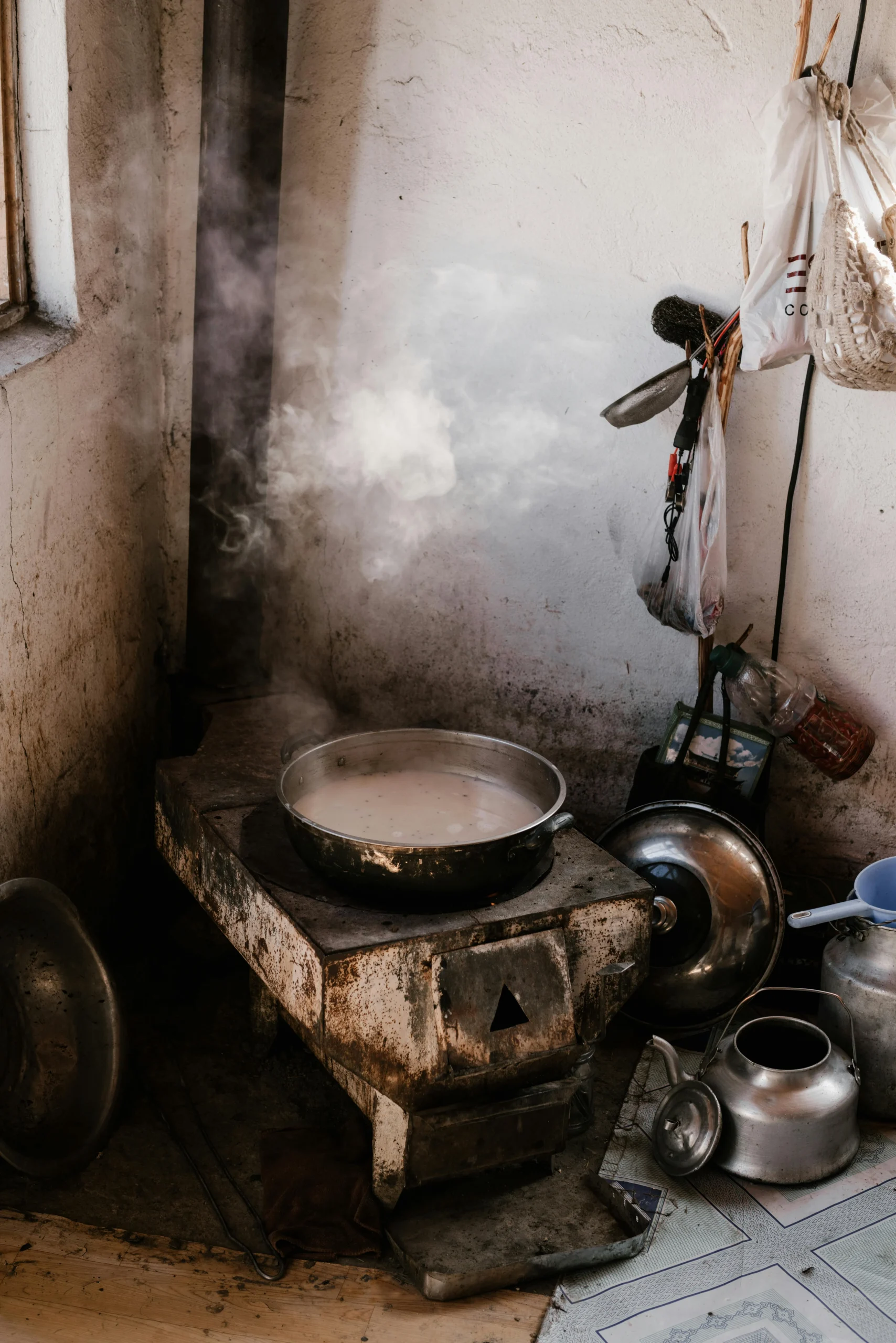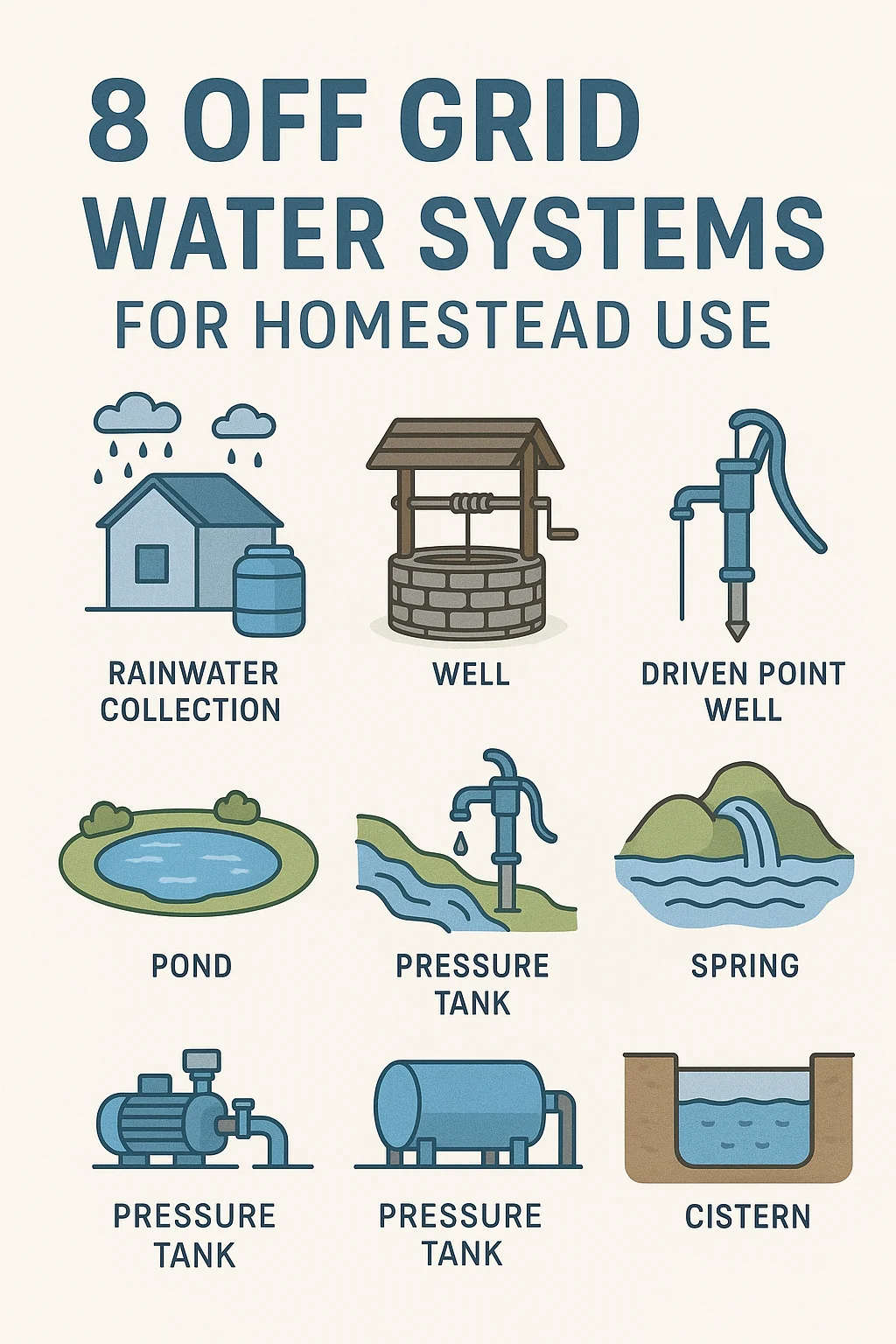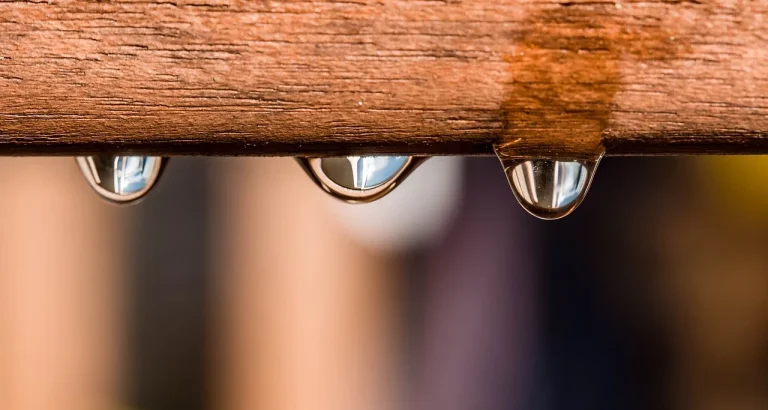Water Freedom Starts with the Right System
When you dream of a self-sufficient homestead, you likely picture rows of crops, solar panels on the roof, maybe a chicken coop nearby. But none of that works without one critical resource: water. If you’re off the grid—or planning to be—you need water systems that are reliable, sustainable, and proven to work long-term. Fortunately, there are multiple off grid water systems for homestead living that go beyond buckets and barrels.

In this guide, you’ll discover eight water systems that are not only possible but actually usable—tested by real homesteaders and suited to a variety of climates and land types. Whether you’re starting from scratch or upgrading what you have, this article will help you choose the best setup for your land, lifestyle, and goals.
Why You Need a Smart Off Grid Water System
Water isn’t just for drinking. On your homestead, you’ll rely on water for:
-
Cooking and washing
-
Irrigation
-
Livestock hydration
-
Food preservation
-
Fire suppression
When you live off-grid, access to clean water can’t be left to chance. Municipal water lines are non-existent or unreliable. Rain patterns are shifting. That’s why every successful homestead needs a system that works with nature—not against it.
Overview: 8 Off Grid Water Systems for Homestead Use

| Water System | Source Type | Energy Needed | Best Use Case |
|---|---|---|---|
| Rainwater Harvesting | Rain | No | General home use, irrigation |
| Solar-Powered Well Pump | Groundwater | Solar | Year-round, high-volume supply |
| Gravity-Fed Spring System | Natural spring | No | Constant flow for remote properties |
| Surface Water Collection | Pond, creek | Optional | Irrigation, animals, backup source |
| Manual Hand Pump | Shallow well | No | Daily needs or emergency backup |
| Hydraulic Ram Pump | Flowing stream | No | Lifting water uphill without power |
| Atmospheric Water Generator | Air humidity | Solar | Supplemental drinking water |
| Cistern Storage System | Stored sources | No | Long-term reserve, emergency use |
1. Rainwater Harvesting System
Rainwater is free, abundant in many areas, and perfect for collection. This system captures roof runoff and funnels it into barrels or underground cisterns.
✅ Pros:
-
Simple and inexpensive
-
Easy to scale up or down
-
Pairs well with gutters and filtration
⚠️ Considerations:
-
Requires regular rainfall
-
Needs pre-filtration for drinking use
-
Storage tanks must be protected from algae and pests
Pro Tip: Add a first-flush diverter to discard the first runoff, which often contains roof debris.
2. Solar-Powered Well Pump
If you have a well or plan to drill one, a solar-powered pump is one of the most reliable off grid water systems for homestead needs.
✅ Pros:
-
Consistent water supply
-
Can run without generators
-
Integrates with water pressure tanks
⚠️ Considerations:
-
Requires upfront investment
-
Needs solar power + battery storage
-
May need a backup manual pump
Bonus: Add a float switch to automate filling your storage tanks.
3. Gravity-Fed Spring Water System
Have a natural spring on your land with higher elevation? Perfect. Gravity-fed systems use pipe and pressure to bring spring water downhill without electricity.
✅ Pros:
-
Zero energy input after setup
-
Can supply entire households
-
Low maintenance long-term
⚠️ Considerations:
-
Spring must be above usage level
-
Must protect the springhead from animals and contamination
-
May require filtration for drinking
This is one of the most sustainable water systems available—especially for remote, mountainous homesteads.
4. Surface Water Collection
Streams, ponds, or creeks on your land can provide a steady source of non-potable water—perfect for irrigation, animals, or filtration.
✅ Pros:
-
Often plentiful and easy to access
-
Useful for gardens, baths, laundry
-
Can be pumped using solar or gravity
⚠️ Considerations:
-
Contaminants from runoff are common
-
Must be filtered/disinfected before drinking
-
May require environmental permits in some regions
Tip: Float your intake hose above the bottom to avoid sediment.
💡 Want a plug-and-play water filtration system designed for off-grid living?
The AquaTower gravity-fed purification system is a highly effective solution for anyone needing clean water without power, pressure, or plumbing. It’s ideal for homesteads, cabins, and even emergency prep.
5. Manual Hand Pump
If you have a shallow well (25 feet or less), a manual hand pump offers a completely power-free water solution.
✅ Pros:
-
Extremely reliable
-
No electricity needed
-
Inexpensive to install
⚠️ Considerations:
-
Shallow wells only
-
Can be labor-intensive
-
Low output per minute
Use it as: A backup to your solar system or as a stand-alone in small cabins.
6. Hydraulic Ram Pump
A hydraulic ram pump uses kinetic energy from a flowing stream to push water uphill—completely off-grid and power-free.
✅ Pros:
-
No electricity, fuel, or solar needed
-
Runs 24/7 with the right setup
-
Great for filling elevated tanks
⚠️ Considerations:
-
Requires steady flow + elevation drop
-
Works best in hilly or mountainous terrain
-
Needs pipe maintenance to avoid clogging
For continuous water delivery to high ground, this is one of the smartest mechanical systems available.
7. Atmospheric Water Generator (AWG)
These devices pull water vapor from the air and condense it into drinkable water—especially useful in humid climates.
✅ Pros:
-
Doesn’t require traditional water sources
-
Completely enclosed and safe
-
Great for drinking and cooking
⚠️ Considerations:
-
Requires 40%+ humidity
-
Needs solar or electrical power
-
Not ideal for large water needs
AWGs work best as a supplemental water system in southern or coastal zones.
8. Cistern Water Storage System
A cistern stores large quantities of water for later use—fed by rainwater, wells, trucks, or surface water.
✅ Pros:
-
Stores thousands of gallons
-
Works with any water collection method
-
Great for fire protection and drought periods
⚠️ Considerations:
-
Requires space and site prep
-
Must be kept covered and clean
-
Can be costly for large tanks
Best practice: Install an overflow drainage and sediment trap.
Recommended Tool: AquaTower Off-Grid Water Filtration System
If you’re building your homestead water plan and want a system that’s reliable, portable, and easy to use, the AquaTower is worth serious consideration.
-
No electricity or pressure needed
-
Filters up to 10,000 gallons per cartridge
-
Removes bacteria, parasites, and harmful contaminants
-
Gravity-fed and 100% off-grid ready
Whether you’re sourcing water from rain, springs, or creeks, the AquaTower gives you clean, safe water for drinking and cooking.
How to Choose the Best Off Grid Water System for Your Homestead
Start by evaluating your land, water access, and needs. Here are the top questions to ask:
| Factor | Why It Matters |
|---|---|
| Climate and rainfall | Determines if rainwater harvesting is viable |
| Topography | Affects feasibility of gravity-fed or ram systems |
| Water demand | Drinking vs. livestock vs. irrigation |
| Budget | From DIY barrels to deep well drilling |
| Energy access | Do you have solar? Will you need a manual option? |
A typical setup might include one main system and one or two backups.
Best Combinations for Homestead Resilience
To avoid system failure or drought, consider layering systems:
-
Well + Rainwater + Cistern
-
Spring + Ram Pump + Gravity Feed
-
Surface Water + Solar Pump + Filtration
Redundancy gives you peace of mind—and coverage for any season.
FAQ – Off Grid Water Systems for Homestead
What’s the most self-sufficient water system?
A gravity-fed spring or ram pump system—requires no power, runs continuously, and costs little once installed.
How much water do I need daily off-grid?
Plan for 5–10 gallons per person per day minimum (plus extra for animals and gardening).
Is rainwater safe to drink?
Yes, with proper filtration—use a first-flush diverter and follow up with charcoal or UV treatment.
Can I live off one system only?
Not reliably. Always plan for drought, system failure, or water contamination.
Which is cheapest to install?
Rainwater collection and manual pumps offer the most affordable entry points for off-grid water.
Conclusion: Build Smarter with Off Grid Water Systems for Homestead Resilience
Your homestead’s success depends on more than just fertile soil or solar panels—it begins with dependable water access. By choosing the right off grid water systems for homestead living, you ensure your land supports not just survival, but long-term self-reliance and comfort.
From rainwater harvesting to solar-powered wells and gravity-fed springs, these systems aren’t just ideas—they’re proven solutions built to work without the grid. Each method brings its strengths, and when layered together, they form a water plan that’s strong, sustainable, and uniquely yours.
👉 Don’t wait until water becomes a problem.
Equip your homestead with one of the most trusted off-grid water purification systems available today—and enjoy clean, dependable water no matter where you live.

